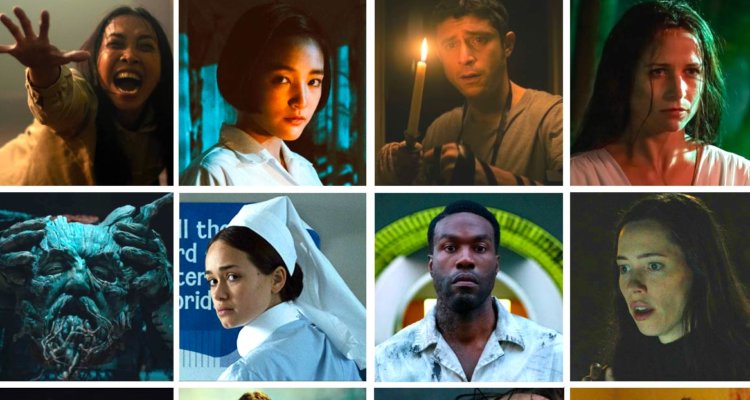10. “Candyman“
As a direct sequel to Bernard Rose’s original 1992 film, DaCosta’s “Candyman” was always looking at an uphill climb. But thanks to standout performances from Yahya Abdul-Mateen II and Teyonah Parris – and a shadow puppet motif that adds elegance to a series of monstrous flashbacks – this feature finds its own voice. In this version of the story, we explore the relationship between gentrification and art, directly pitting a rising star in the art world against the Candyman mythos.
There are ideas present in “Candyman” – about the commoditization of Black trauma and the acceptance of violence as an act of resistance – that deserve to be unpacked further, especially at a distance from the current conversations around racial justice. Of course, it is possible that “Candyman” is the unnecessary sequel that some believe it to be, but I’d wager time will be kind to DaCosta’s feature.
(Read Leslie Byron Pitt’s review of “Candyman”)
9. “The Night House“
In a more typical year, David Bruckner’s “The Night House” would have hit theaters riding a rapturous word-of-mouth campaign following a successful film festival run. But as one of many films shelved in response to the COVID-19 pandemic, “The Night House” feels like a film that did not quite get its due. Here a new widow struggles through the stages of grief in the wake of her husband’s suicide. It is not long before she realizes he was leading a parallel life (in both senses of the word) that threatens her happiness, too.
Nothing is as key to the success of “The Night House” as Rebecca Hall’s performance. Whipping between the stages of grief – there’s a happy hour scene in the film where Hall delivers maybe the monologue of the year – the actress gives the kind of bravura performance that could and should generate award season buzz.
(Read Jessica Kiang’s review of “The Night House”)
8. “The Queen of Black Magic“
Thanks to films like “Satan’s Slaves” and “Impetigore,” filmmaker Joko Anwar has been on the leading edge of the modern wave of Indonesian horror. So it is not a surprise that he and director Kimo Stamboel brought their A-game to “The Queen of Black Magic,” a loose remake of the 1981 Indonesian horror movie of the same name. In this new version, three men and their families are caught in a web of black magic when they return to the orphanage they once called home.
With a running series of torture scenes that would make Clive Barker proud, “The Queen of Black Magic” has all the creative violence we’ve come to expect from Indonesian horror. But it’s important to note that this is not a needlessly cruel film; the concepts of culpability explored in Stamboel’s film layer in a few uncomfortable questions atop the puddles of blood and gore.
7. “My Heart Can’t Beat Unless You Tell It To“
Don’t judge a horror film by its title. Jonathan Cuartas’s feature film debut may have the title of a ‘70s Italian slasher, but you’d do well to frame your expectations around something like “Let the Right One In.” Like the latter film, “My Heart Can’t Beat Unless You Tell It To” is a melancholy treatise on the lengths people will go to protect their family – even if their family has an unquenching thirst for blood.
With a trio of standout performances at the forefront – including Patrick Fugit as the reluctant alpha male of the group – Cuartas’s film is less interested in the mechanics of vampirism than the psychological scars it causes the rest of the family. It also serves as an emotional allegory on the sorrow of familial caretakers, those who place their lives on hold to look after loved ones with adult illnesses.
6. “The Vigil“
Is it time to retire the notion that January and February are dumping grounds for bad films? With at least two titles on this list hitting theaters or VOD in February, it’s become increasingly true that every month is a good month for horror fans. Keith Thomas’s “The Vigil” was a particular standout this past year, transforming a single location and a modest budget into one of the year’s creepiest horror features.
Despite cutting ties to his Orthodox community, young Ronen accepts a gig keeping vigil over a recently departed elder. Before long, Ronen learns that he is the target of an evil spirit who has plagued the deceased since his time in a concentration camp. Among its many feats, “The Vigil” serves as a welcome departure from the dominance of Christian ghost stories in popular culture, depicting (without exploiting) the rituals of Orthodox Judaism onscreen.
(Read Nicholas Laskin’s review of “The Vigil”)

